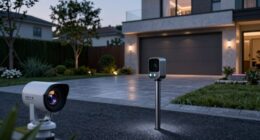You no longer require a landline for a home security system. Most modern systems utilize cellular networks, ensuring dependable monitoring and instant alerts. These systems can function even during power outages, thanks to battery backups. By eliminating the need for a landline, you’ll cut down on monthly phone bills while receiving real-time notifications directly on your mobile device. Additionally, many of these systems provide simple DIY installation and integration with smart home devices. If you’re interested in learning more about the available options and how they operate, you may discover some valuable insights coming up.
Key Takeaways
- No-landline security systems operate effectively using cellular and Wi-Fi networks, eliminating the need for traditional phone lines.
- Cellular connections ensure continuous monitoring and alerts during power outages, enhancing system reliability.
- Many modern security systems offer mobile app notifications for real-time awareness without landline dependency.
- DIY installation options allow for straightforward setup of no-landline systems, simplifying the process further.
Overview of Landline Necessity
In today's world, you really don't need a landline for home security, as most systems now rely on cellular connections for effective monitoring. Only about 40% of American adults still keep landlines, highlighting a significant shift in how security systems communicate.
Cellular connections offer a reliable way to receive alerts, especially during power outages, which traditional landlines can't guarantee. Additionally, modern systems often come equipped with features akin to those found in garage door openers, allowing for enhanced home security with remote access capabilities.
With the rise of smart home technology, many DIY home security systems integrate seamlessly with cellular and internet-based platforms. This means you can monitor your home's security from anywhere using your smartphone or other devices. The convenience of managing your system without a landline not only enhances your security but also simplifies your life.
Furthermore, eliminating the need for a landline can save you money, as you won't have to maintain a separate phone line just for security purposes. You can invest those savings into a more advanced security setup or additional smart devices that enhance your home's safety.
Advantages of No-Landline Systems

The advantages of no-landline systems include enhanced reliability and advanced features that modernize home security, ensuring you stay connected and protected at all times.
Unlike traditional systems, no-landline systems primarily use cellular networks, which provide reliable alerts and communication even during power outages. This means that when the lights go out, your home security remains active and vigilant.
Additionally, the use of air purifiers improves indoor air quality, creating a healthier living environment that complements your security measures.
As an added bonus, making the switch from a landline can lead to significant cost savings. Many households maintain a landline solely for security purposes, but you can eliminate that expense with a no-landline system.
Moreover, these modern systems often come equipped with battery backups and cellular connections, ensuring continuous operation even during outages.
You'll also enjoy features like smart home integration, enabling you to control your security setup alongside other smart devices.
Plus, with real-time alerts sent directly to your mobile device, you'll always know what's happening at home, no matter where you are.
Key Features of Modern Systems

Modern home security systems boast a range of key features that enhance your safety and convenience, making them an essential investment for any homeowner. These systems mainly operate without landlines, relying on cellular and internet connections for reliable communication and monitoring.
One standout feature of these wireless home security systems is their high-quality video surveillance cameras, which often include HD and night vision capabilities for superior monitoring. Additionally, implementing keyword clustering can improve user experience by connecting related security features effectively.
You'll appreciate the advanced real-time alerts that notify you immediately of security breaches. Through mobile applications, you can stay informed and take action from anywhere. The user-friendly interfaces of these systems make it easy to customize settings according to your preferences, enhancing your overall experience.
Another key advantage is the integration with smart home devices, such as smart locks and lighting controls. This functionality provides you with enhanced control and automation, allowing you to manage your home security seamlessly.
How No-Landline Systems Operate

Utilizing cellular networks and Wi-Fi, no-landline home security systems communicate effectively without relying on traditional phone lines. These advanced security systems use cellular chips to connect wirelessly to monitoring centers, ensuring real-time alerts and rapid response times.
| Feature | Description | Benefits |
|---|---|---|
| Cellular Network | Enables communication without landlines | Increased reliability |
| Backup Options | Battery power or cellular connectivity during outages | Continuous protection during power outages |
| Mobile Applications | Remote access and notifications | Enhanced control and convenience |
This means even during a power outage or internet disruption, your security system remains functional. You can easily monitor your home and receive notifications through mobile applications, putting you in the driver's seat. By choosing a no-landline system, you're opting for more modern technology that prioritizes your safety and flexibility. So, if you're considering a home security upgrade, it's worth exploring these no-landline options for peace of mind. They're designed to keep you connected, no matter what!
Comparison of Leading Providers

When comparing leading home security providers, it's important to take into account factors like installation options, monitoring plans, and overall reliability.
Understanding the importance of quality assurance in software development can also apply to home security systems, as a reliable provider guarantees your safety and peace of mind.
ADT stands out with a SecurityScore of 9.8/10, offering professional monitoring and DIY security, backed by over 150 years of experience.
Frontpoint, rated 8.9/10, guarantees 100% cellular backup and boasts excellent customer support, with monitoring plans beginning at $49.99 per month.
On the other hand, SimpliSafe leads the market with a SecureScore of 9.2/10, focusing on wireless equipment and ease of installation, with packages starting at $249.96.
If you're looking for affordability, Cove is a solid choice, scoring 8.8/10 and offering extensive monitoring services starting at just $150.
Ring Alarm is also a prominent option, rated 7.7/10, known for its DIY installations and Alexa compatibility, but keep in mind its past hacking issues.
Each of these providers offers unique strengths, whether you're after the best home security systems, professional monitoring, or DIY solutions.
Make sure to evaluate your needs to find the right fit for your home.
Installation Options and Considerations

Evaluating your options, most home security systems today offer flexible installation methods that don't rely on a landline. You can choose between professional installation or user-friendly DIY setups.
If you prefer a hands-on approach, many systems, like Ring Alarm, come with peel-and-stick components, making it easy to get your system up and running without any tools. Additionally, ensuring your system is compatible with your home's setup can enhance functionality, especially if you contemplate adding top room fans for summer cooling for comfort while monitoring your security.
If you opt for professional installation, it typically takes about an hour, ensuring everything is properly set up. Regardless of the method you choose, it's crucial to reflect on the backup battery options. Many no-landline systems include battery backups that maintain functionality during power outages, keeping your cellular service operational even if Wi-Fi goes down.
The shift from traditional landline systems is straightforward, and assistance is available to help you migrate to modern communication methods.
Cost Analysis of No-Landline Systems

Many homeowners find that opting for no-landline security systems can be a cost-effective choice, balancing initial equipment expenses with ongoing monitoring fees.
When conducting a cost analysis, you'll notice that monthly fees for professional monitoring typically range from about $17.99 to $49.99, depending on the security company and features you choose. Additionally, understanding your partner's priorities can be essential in making decisions about home security, as it reflects on the emotional safety within the home relationship health.
Initial equipment costs can vary greatly, starting around $99 for basic setups and going up to $599 for more extensive systems. If you're looking to save money, consider DIY options, which often provide budget-friendly installation solutions and eliminate professional installation fees.
It's also important to remember that most providers don't charge differently for landline versus cellular backups. This means you should focus on the overall value and features rather than just the cost.
Alternatives to Traditional Landlines

Alternatives to traditional landlines have gained popularity, with options like cellular and internet services providing reliable communication for modern home security systems. Only 40% of American adults still use landlines, highlighting the shift towards more effective communication methods. Cellular service offers dependable monitoring without the need for landlines, while Wi-Fi and Ethernet connections enable faster response times for security systems.
Here's a comparison of different alternatives:
| Option | Pros | Cons |
|---|---|---|
| Cellular | Reliable, no landline needed | May require a monthly fee |
| Wi-Fi | Fast response times | Dependent on internet stability |
| Ethernet | Consistent connection | Requires wiring, less flexible |
| Hybrid Systems | Combines strengths of both | Potentially higher cost |
| Smart Devices | Remote access and control | Vulnerable to hacking |
Security Benefits of Wireless Systems

Wireless home security systems offer several advantages, including reliable communication during power outages and enhanced monitoring capabilities. Unlike traditional landline systems, these wireless solutions utilize cellular connections, ensuring your home stays protected even when the power goes out.
With over 40% of American adults ditching landlines, modern home security systems have adapted to this shift by providing features that enhance security. Additionally, understanding the mental health implications of stress can further highlight the importance of feeling secure in your home, as mental health support is essential for overall well-being.
One significant benefit is the ability to receive real-time alerts via mobile apps, allowing you to respond swiftly to any potential threats. This immediacy gives you greater control over your home's safety.
Additionally, many wireless systems come equipped with high-quality video surveillance, offering HD and night vision options for thorough monitoring. You can keep an eye on your property, no matter where you are.
Furthermore, the integration of smart home technology with wireless home security systems creates a more cohesive security network. You can connect smart locks, lighting, and other devices, increasing both convenience and safety.
Transitioning From Landline Systems

If you're considering moving away from landline systems, you'll find that cellular security solutions offer numerous benefits.
Not only does the installation process become simpler, but you'll also save money in the long run.
Let's explore how making this shift can enhance your home security experience.
Benefits of Cellular Systems
Cellular systems offer a reliable and efficient way to enhance your home security, especially during power outages when traditional landlines may fail.
Unlike landline systems, cellular connections guarantee that your security cameras and alarms remain active, providing peace of mind even in emergencies. As more than 60% of American adults have moved away from landlines, it's clear that cellular solutions are becoming the preferred choice for home security.
Here are some key benefits of cellular systems:
- Immediate alerts: You'll receive faster notifications for any security breaches, allowing for quicker responses.
- No maintenance costs: By eliminating landline maintenance, you can enjoy significant financial savings, making cellular systems more cost-effective.
With these advantages, making the switch to a cellular-based home security system can provide you with better protection and peace of mind.
Embracing this technology means staying connected and secure, no matter the circumstances.
Simplified Installation Process
Shifting from traditional landline systems to modern security solutions is designed to be straightforward and user-friendly. You'll find that many contemporary security systems offer a do-it-yourself (DIY) installation option, making it easy for you to install the system without the need for professional help. Most setups involve simple peel-and-stick components, eliminating the hassle of tools and complex wiring.
If you prefer not to tackle the installation alone, professional installation is available and typically takes about an hour. This guarantees a quick change to a more efficient security system without significant downtime. Throughout this process, support is readily available to guide you, so you can feel confident in your ability to maintain your security without relying on landlines.
Modern systems utilize enhanced communication methods, such as cellular and internet connections, guaranteeing reliable alerts and responsiveness. By making this shift, you not only streamline your security setup but also gain peace of mind knowing your system is up-to-date and effective.
Embrace the simplicity of moving to a no-landline security solution and enjoy the benefits it brings.
Cost Savings Overview
Shifting from landline security systems can save you a considerable amount each month by cutting out those unnecessary landline bills. On average, these bills range from $20 to $40, money you can redirect towards more efficient security options. Modern systems utilize cellular and internet connections, which not only reduce costs but also provide greater reliability.
By converting to no-landline systems, you can benefit from:
- Competitive monitoring plans ranging from $9.99 to $49.99 per month
- Enhanced functionality during power outages, keeping your home secure
These cost savings make it easier to invest in advanced technologies without the burden of maintaining a landline connection. With cellular options, you gain robust communication channels that traditional landline security systems often lack.
Not only do you save money, but you also enhance your home security setup, ensuring it remains functional during emergencies. Ultimately, moving away from outdated landline security systems allows you to embrace a more affordable, reliable, and modern approach to home protection.
Frequently Asked Questions
Do Security Systems Need Landline?
Security systems don't need a landline anymore. You can use cellular or internet connections instead. These options provide reliable alerts, greater security, and better integration with smart home technology, making them excellent choices for your home.
Is a Landline Required for Adt?
ADT's advanced alarm systems are designed to depend on cellular connections, ditching outdated landlines. You'll enjoy dependable monitoring and seamless integration with smart devices without being tied down to traditional phone lines.
Does Ring Alarm Need a Landline?
No, Ring Alarm doesn't need a landline. It operates through cellular and internet connections, making it easy for you to set up and manage your home security without relying on traditional phone services.
What Is Required for a Home Security System?
Think of your home as a fortress; for security, you'll need a reliable internet connection or cellular network. These modern systems use wireless technology, ensuring protection without the weight of a traditional landline.
Conclusion
In today's world, you really don't need a landline for your home security system.
With advanced wireless technology, you can enjoy reliable protection without the hassle of traditional phone lines.
Why limit yourself when there are modern alternatives that offer flexibility and convenience?
By choosing a no-landline system, you not only save money but also enhance your security.
Embrace the future of home protection and keep your space safe with the latest innovations.









